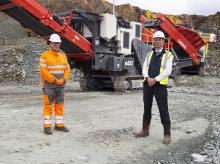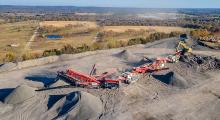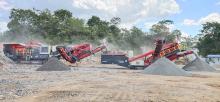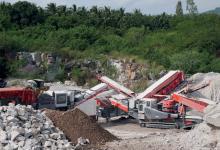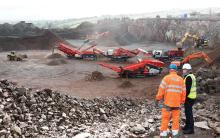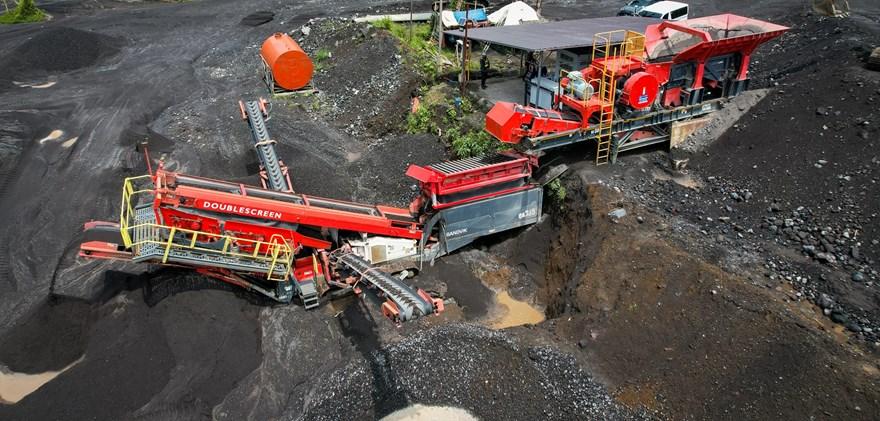BAM Ritchies is the ground engineering division of BAM UK and Ireland, which provide fully integrated services for a wide range of public and private customers, from small local projects to critical national infrastructure. The UK's largest drill and blaster are responsible for over 40% of the UK's contracts. Over 60 years, they have built a reputation as the go-to ground engineering team for complex problem-solving and best-value, sustainable delivery.
It was back in 2017 when BAM was selected by the British Antarctic Survey (BAS)* to partner with the Antarctic Infrastructure Modernisation Programme (AIMP). This modernisation project represents one of the largest UK Government investments in polar science infrastructure since the 1980s. It will transform how the British Antarctic Survey enables and supports frontier science and ensures that Britain remains at the forefront of climate, biodiversity and ocean research in the Polar regions.*
Joined by BAS technical advisors, Ramboll and their designers Sweco, BAM was chosen by UK Research Innovation (UKRI) and National Environment Research Council (NERC) to partner with British Antarctic Survey for the £300m infrastructure programme, which will span over a seven-year framework.
A part of the project was the modernisation of Rothera Research Station, BAS' largest facility and a centre for biological research and hub for supporting deep-field and air operations. This redevelopment includes a new science and operations facility, the Discovery Building, a rebuild and update of the wharf, and the introduction of carbon-reducing technology.
BAM needed a processing train to crush and screen the abrasive grandiorite material to be recycled and reused at the research station for construction purposes. Already familiar with Sandvik mobile equipment and experience using Sandvik Hydrocone crushing technology, Jan Cordon, Contracts Manager Drill and Blast at BAM Ritchies, and Harry McMullan, Quarry Manager for the project, contacted Sandvik Mobile crushing and screening.
Versatile operation
Due to their versatility and performance capacity, a Sandvik QH332 Hydrocone crusher and QA335 Doublescreen were selected for this particular application and job. The equipment is being used for crushing the material down to make resurfacing material for an 800m unpaved gravel runway. The sub 80mm feed, crushed by a QJ341 jaw crusher previously on site, is processed to produce the following fractions; surface course 0-16mm, base course 0-25mm, levelling course 0-75mm and sub-base <100mm.
The Sandvik QH332 is a tracked, self-propelled cone crusher designed for versatility, safety and high performance. Featuring the Sandvik Hydrocone crusher, it comes with a choice of six different crushing chambers and a variety of varying bush settings. This is one of the great advantages of the Sandvik cone and its ability to adapt to suit the specific application's needs. It is one of the traits that Harry comments on as to why they decided to invest in Sandvik. "The cone crushers have a wide choice of set-up with different concave and mantle configurations plus different throws, which allows the machine to be adjusted and configured to a wide range of products."
The QA335 was selected due to its flexibility and ability to screen the products to the required sizes accurately. A mobile screener was required to screen the material down and remove the fines so it could be reused for resurfacing the runway. The Doublescreen technology features two high-velocity, angle-adjustable screens, where both the primary and secondary screening angles can be adjusted to optimise screening performance and accuracy. Two independent double-deck screens provide a single machine capable of performing two screening processes.
Working in one of the world's most harsh climates
Living and working in the Antarctic is no mean feat, and with temperatures ranging from 5°C to -40°C, it poses many environmental challenges. BAM say that working with the whole AIMP partnership, extending from client to supply chain has been key in this uniquely challenging environment.
To ensure the Sandvik mobile units could operate in this extreme climate, all units were fitted with an arctic package.
Harry says they have had no issues with the operation and have been pleased with the performance. "Both machines have performed exceptionally well considering the harsh environment they are working in."
Due to the remote location and nature of the application, aftermarket support has been crucial in ensuring the success of this project. This has been vital in having technical service available when required and the right spare parts and consumables on the ground when needed by placing a large stock order in advance. "Support from Sandvik service engineers has been excellent, and they have been available on the phone when required," says Harry. "I would not hesitate to recommend Sandvik as a supplier".
Building a more sustainable future
Climate change is an important topic and one of the biggest challenges which face our planet today. As a construction and mining equipment supplier, Sandvik is committed to reducing its impact on the climate and strives to be a leading sustainability partner for its customers. The company shares the same vision and goals as its customer BAM and is proud to participate in this project, working together to build a more sustainable future.
*British Antarctic Survey (BAS) delivers and enables world-leading interdisciplinary research in the Polar Regions. Its skilled science and support staff based in Cambridge, Antarctica and the Arctic work together to provide research that uses the Polar Regions to advance our understanding of Earth as a sustainable planet. Through its extensive logistic capability and know-how, BAS facilitates access for the British and international science community to conduct research in the polar regions. Numerous national and international collaborations and an excellent infrastructure help sustain a world-leading position for the UK in Antarctic affairs.

